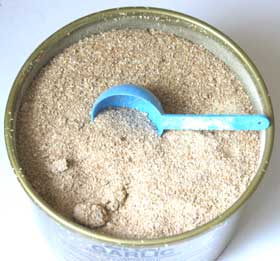
Feeding Garlic to Horses - benefits and dangers
 There is debate as to how much garlic should
be fed as a feed supplement to horses, although it has
many claimed benefits such as having anti-septic, anti-inflammatory and
antibiotic effects, reducing blood pressure, improving
respiratory problems in horses and acting as a fly repellent
- recent research has shown that feeding large amounts of garlic to horses
may have dangers as it can cause anaemia.
There is debate as to how much garlic should
be fed as a feed supplement to horses, although it has
many claimed benefits such as having anti-septic, anti-inflammatory and
antibiotic effects, reducing blood pressure, improving
respiratory problems in horses and acting as a fly repellent
- recent research has shown that feeding large amounts of garlic to horses
may have dangers as it can cause anaemia.
Garlic is used by many horse and pony owners as a regular equine feed supplement. It contains substances with benefits of pain-relieving, anti-inflammatory and reduce swelling.
It is believed that garlic is one of the most effective natural healing substance in the world. It is popularly used, in conjunction with anti-biotics to treat equine respiratory diseases and infections in the horse's lungs.
SELENIUM AND SULPHUR IN GARLIC
Garlic is rich in Selenium and Sulphur. Sulphur is recognised as having blood cleansing properties that are useful in treating and preventing equine disease. It is also believed to contain over 25 germ-killing compounds.
Many horse owners feed an equine garlic supplement for its insect repelling qualities - the sweat produced by a horse fed on garlic gives out an odour that keeps flies, ticks and midges away - making it a natural fly repellant.
Garlic can be used used to give relief from the symptons of coughs - it contains a substance that helps to clear mucus in the airways. This cleansing action, together with its ability to reduce inflammation, also benefits the urinary tract.
The recommended amount to feed is half an ounce to 2 ounces per day depending on the horse or pony's size. It comes in several forms for equine use - powder, freeze dried granules and some herbalists claim freshly grown garlic is the best way to feed it.
GARLIC AND ANAEMIA IN HORSES
However feed with care as it is being discovered that there are dangers in feeding too much garlic as it can can cause anemia in horses.
TOXIC EFFECTS OF GARLIC FOR HORSES
There is a toxic element in Garlic called N-propyl disulfide which can change an enzyme within a horse's red blood cells, it depletes the cell of a chemical known as phosphate dehydrogenase - whose task is to protect the blood cells from damage caused by oxidation
Researchers fed a healthy horse 1 lb of onion tops, which also contain N-propyl disulfide, over an 11 day period. By the 11th day the horse had lost almost 60% of his red blood cells and was severely anaemic!
Some vets claim that the toxic effects of garlic are gradual - a low dose fed on a regular basis can result in mild anemia.
COMMERCIALLY MADE GARLIC SUPPLEMENTS FOR HORSES
However it may be that commercially prepared equine garlic supplements are not dangerous as the active ingredient -allicin - is often destroyed during the manufacturing process when heat dried.
The benefits of garlic are many and if you do decide to feed a garlic supplement to your horse or pony just be careful not to overdo it.
|
|
HORSE CARE ADVICE AND EQUESTRIAN ARTICLES
Horse Worming Myths | Straightbar Eggbutt Snaffle | Homeopathic Colic Remedies For Horses| Horse Ringworm | Feeding Haylage Horses | Garlic Supplements for Horses |Angleberry - wart virus in horses | Horse Sweat Rash | Horse Rain Rot | Devil's Claw | Horse Ringbone| Cushings disease in Horses | Livery Yards East Sussex | Horse feed - Norfolk | Arnica for Horses | Symptoms of Choke in Horses | Pony Sidebone | Horse bedding advice | Horse Dentists | Horse and Hound | Iridology for horses | Bog Spavins | Riding Horse in a Standing Martingale | Berkshire Tack Shops and Saddlery | Turmeric |
